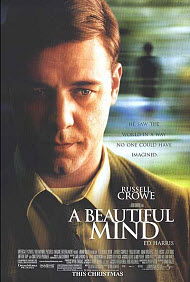A Beautiful Mind
 for intense thematic material, sexual content and a scene of violence.
for intense thematic material, sexual content and a scene of violence.
Reviewed by: Erik Maxwell
CONTRIBUTOR
| Moral Rating: | Average |
| Moviemaking Quality: |
|
| Primary Audience: | Teens Adults |
| Genre: | Drama |
| Length: | 2 hr. 23 min. |
| Year of Release: | 2001 |
| USA Release: |
December 21, 2001 |

Fear, Anxiety and Worry… What does the Bible say? Answer

Why does God allow innocent people to suffer?
Physical healing—Is it guaranteed in Christ’s atonement?
Depression—Are there biblical examples of depression and how to deal with it?
What should a Christian do if overwhelmed with depression?
| Featuring | Russell Crowe, Ed Harris, Jennifer Connelly, Adam Goldberg, Paul Bettany |
| Director |
Ron Howard |
| Producer | Brian Grazer, Ron Howard |
| Distributor |
Generalized Anxiety Disorder is a persistent and uncontrollable anxiety in certain life areas. I have been diagnosed with this condition. For me, my anxiety comes in not talking “just perfectly” or typing“just perfectly,” or even in reading or thinking just perfectly. Right now, the typing mistakes that I am inevitably making are driving me crazy, but I am trying very hard not to let them bother me. Often I find myself on the verge of nervous breakdown, facing great difficulty in simply concentrating on something that becomes so stressful.
John Nash (Russell Crowe) in Ron Howard’s “A Beautiful Mind” also suffers with a disorder. He has schizophrenia which makes him see and interact with people that only he can see, in short because they are figments of his imagination. For me, “A Beautiful Mind” is remarkably therapeutic. Nash faced a much more serious problem from mine, yet was able to overcome his difficulties and go so far as to win the Nobel Prize! The overwhelming message of this film is that people can get better, and as Nash’s wife Alicia (Jennifer Conneley) says, “I have to believe that something extraordinary can happen.” And it does. Believe me—it does.
Nash is one of the elite number of people who attended Princeton University in the 1940s. While attending, despite slacking off and not attending classes, he manages to turn in a paper to the Dean so revolutionary that the Dean claims it brilliantly disagrees with the past 150 years of economics. As flattering as this is, Nash’s life doesn’t get better. A member of the Department of Defense, Parcher (Ed Harris) meets up with him and, recognizing his genius, appoints him to the daunting task of scanning major U.S. periodicals on the lookout for coded messages from the Russians hidden in their articles. Nash works 24 hours a day, often without food, reading and rereading publications such as “The New York Times” until thousands of clippings, all marked up, are posted up throughout his home office.
Of course, it’s a secret mission he’s involved in. Parcher warns him not to divulge his work to anyone—not even his wife. But when Alicia finally does discover his work, things take such a mind-bending turn that it makes the hair stand on end.
Without giving away any more plot, Nash is ultimately diagnosed with incurable schizophrenia and finally decides to confront his demons—no matter how hard this may be.
“A Beautiful Mind” is truly a masterpiece of acting, directing, and writing. While scenes of Nash’s breaking down may be too intense for young children, this film is perfect therapy for anybody searching for inspiration. It provides truth that people CAN and often DO get better. I left the theater happier… lighter… less desperate, with the realization that there truly is no reason why hope should cease. Is this a Christian virtue? Certainly. The subtle message being taught is that “I can do all things through Christ who strengthens me.” While “A Beautiful Mind” doesn’t come right out and say it as such, this film is certainly one of the most spiritual I’ve encountered. It serves as an excellent choice for anyone who believes that one should never stop wishing, hoping, and praying for healing. This film is truly a gift and has my vote for “Best Picture of 2001.”
Thanks to modern day science, there is medication for my disorder, and time has come when I must take it. I thank God every day for it. May this film serve as a reminder to pray for those suffering with illness.


This rings true with his self-written bio, as you can see at:www.nobel.se/economics/laureates/1994/nash-autobio.html The second to last paragraph, especially, implies that being deluded is actually a good thing in terms of mental abilities and significance. With some further collaborated research, the “rest of the story” is not so heartwarming for the actual Dr. Nash. He had a child named John in 1953 with Eleanor Stier whom he refused to marry. Dr. Nash refused to support the child who was eventually given up to foster care. The real Dr. John Nash was fired after getting arrested in a homosexual sting operation in 1954, after two failed homosexual relationships. It was “intergalactic aliens”, not Russians, whom he believed were sending coded messages through the popular press. He did marry Alicia Larde from South America in 1957 whom he also had a child with, and who was also named John. But Alicia eventually divorced Dr. Nash after he tried to defect from the US in Europe. For this movie, the real Dr. Nash’s life-story has been significantly Hollywoodized. The movified plot was indeed heartwarming. Pity the actual life.
[Average / 5]
[Better than Average / 4]
[Average / 4]
[Good / 3]
[Average / 3]
[Excellent! / 4½]
[Better than Average / 5]
[Average / 5]
[Better than Average / 3½]
[Better than Average / 5]
[Better than Average / 4]
[Better than Average / 5]

Unbeknownst to Nash, he had been working in parallel with Ennio de Giorgi of Pisa, Italy. De Giorgi was actually the first to solve the problem, at least for the case of “elliptic equations.” It is this occasion that seems to have sparked the beginnings of Nash’s delusions. Faced with NOT being the first to solve the problem, AND with having to share mathematics’ prestigious Fields medal, Nash’s considerable ego and self-reliant intellect apparently chose NOT to cope with these “shortcomings.” So, Nash did NOT overcome his paranoia/schizophrenia to achieve Nobel-greatness.
The delusional mental disturbances actually originated AFTER Nash’s Nobel laureate work, AFTER he was married and while wife Alicia was pregnant. As a consequence he resigned his faculty position at M.I.T., spent 50 days under “observation” at the McLean Hospital, and even traveled to Europe attempting to defect and gain status there as a refugee—which was “politically-correct”-ly left out of the movie. (Don’t want to destroy the movie audience’s delusions of this man’s greatness). It’s actually sad and pitiable that the man was so acclaimed and rewarded 44 years after the fact, and has nothing since that fact to show for those 44 years. Then 52 years after the fact, a movie is made endearing a perceived accomplishment and, albeit, bittersweet life. Nash’s has actually been a rather pathetic life. He spent the vast majority of it deluding himself, ultimately because he had relied too heavily ON himself—and failed—as all such men do. It’s a shame that he never came to rely on his Creator.
My Ratings: [Average / 5]